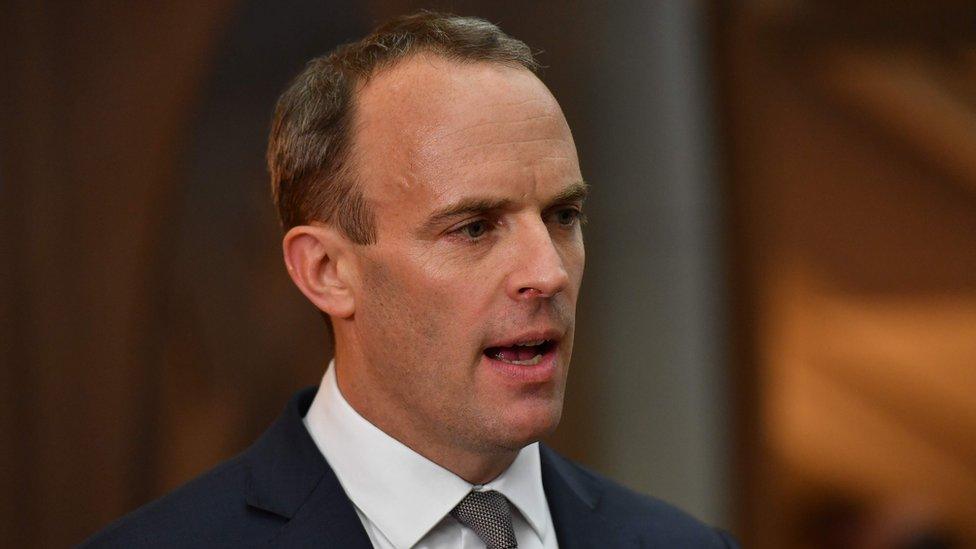DUP 'won't accept' Brexit Irish Sea checks
- Published
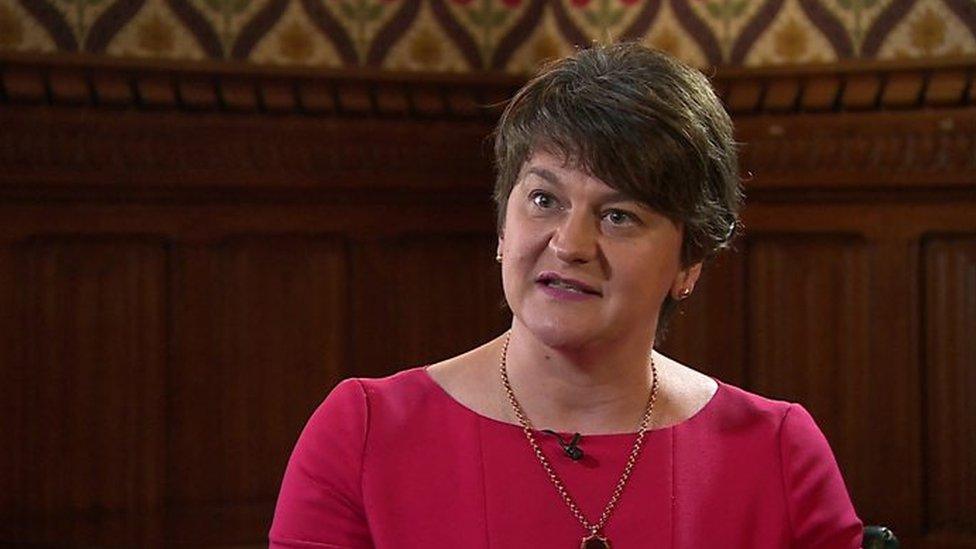
Arlene Foster opposes customs checks in the Irish sea
The DUP will not support a Brexit deal which could lead to any new checks on goods coming into NI from elsewhere in the UK, its leader has emphasised.
"We cannot have either a customs border or a regulatory border down the Irish Sea," said Arlene Foster. "That would make us separate from the UK."
There has been speculation the UK could agree to regulatory checks at Irish Sea ports as part of a backstop deal.
Both sides have agreed the need for a backstop but not how it should operate.
It would apply if the Irish border cannot be kept as frictionless as it is now in the context of a wider deal.
The EU has proposed a backstop that would mean Northern Ireland staying in the EU customs union, large parts of the single market and the EU VAT system.
'We are not bluffing'
The UK government has rejected it as a threat to the integrity of the UK and suggested a backstop that would see the UK as a whole remaining aligned with the EU customs union for a limited time after 2020.
It has not yet brought forward plans about how to deal with regulatory issues - EU single market rules on food, agriculture and other manufactured goods.
NI secretary Karen Bradley told the Conservative Party conference the government would "never ever allow a border down the Irish Sea".

What do 'checks in the Irish Sea' mean?
In a backstop situation, there could in theory be two types of Irish Sea checks:
Customs - to make sure the right EU tariffs have been paid
Regulatory - to make sure goods meet EU safety and quality standards
The government has been adamant it would never accept Irish Sea customs checks.
But it has also been careful not to completely close down the prospect of regulatory checks.

Mrs Foster said her party would not accept customs or regulatory checks in the Irish Sea as a means of breaking the Brexit deadlock.
"We are not going to allow the UK to be broken up by Brussels or anybody else," she told a DUP fringe event at the conference in Birmingham.
"It won't be a semi detached part. [EU chief negotiator Michel] Barnier cannot annexe the UK. We are not bluffing."

Mark Devenport, BBC News NI Political Editor
Arlene Foster said the Irish sea checks which take place already, in regard to matters like animal health, are "there for a very good reason, and are obviously something that will continue.
"But new added burdens between Northern Ireland and Great Britain are something that will make us less competitive and will cause difficulties for our economic well being and that's something we cannot countenance, never mind the constitutional position as well."
The DUP leader denied her party was playing one wing of the Conservatives off against another, after she praised Boris Johnson in an interview with the Daily Telegraph.
Mrs Foster said she had simply answered a question about whether a change in the Conservative leadership would cause a difficulty for the DUP's confidence and supply agreement, by clarifying that it would not, as the deal had been signed by the two parties, not individual leaders.
Mrs Foster acknowledged there "seems to be a lot of division going on within the Conservative party" but added that her focus is on securing a Brexit deal which works for Northern Ireland, the whole of the UK and Europe as well.

In recent months, Mr Barnier has talked about "de-dramatising" the backstop.
It is understood he believes any new physical checks could be limited to food products coming into NI from the rest of the UK.
Arlene Foster said the Brexit process was reaching a "crunch time" and her party was speaking to the government on an ongoing basis.
Allow X content?
This article contains content provided by X. We ask for your permission before anything is loaded, as they may be using cookies and other technologies. You may want to read X’s cookie policy, external and privacy policy, external before accepting. To view this content choose ‘accept and continue’.
Following the general election in June 2017, the DUP and Conservatives formed a confidence-and-supply deal.
Theresa May relies on the DUP's 10 MPs' support to give her a majority in Parliament.
'Reckless'
The 1998 Good Friday Agreement saw the removal of security checkpoints from crossing points and helped make it an all but invisible divide - something which was relatively easy to achieve due to the UK and the Republic of Ireland's shared EU membership.
However, since the Brexit referendum, the Irish question has remained a serious point of contention.
Mrs Foster has come under fire for suggesting the terms of the agreement could be altered in efforts to strike an EU exit deal.
Taoiseach (Irish prime minister) Leo Varadkar told the Irish parliament that the Good Friday Agreement is not up for negotiation.
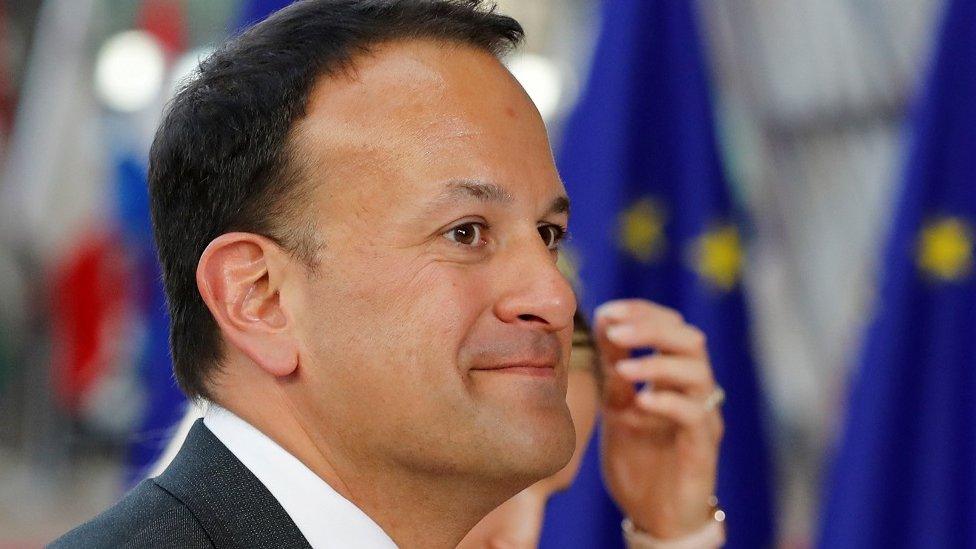
Leo Varadkar said the Irish government would defend the primacy of the Good Friday Agreement
He said it was an international agreement between the British and Irish governments, with multi-party support, and cannot be changed unilaterally by any one government or political party.
Mr Varadkar was responding to a question from Sinn Féin leader Mary Lou McDonald, who described Mrs Fosters comments as "reprehensible, wrong, unacceptable and dangerous".
Sinn Féin leader Mary Lou McDonald had earlier called on the Irish Government to "protect" the Good Friday Agreement, dismissing Mrs Foster's comments as "reckless".
The Good Friday agreement was "not a chip to be bargained with as part of the Tory-DUP deal", she said.
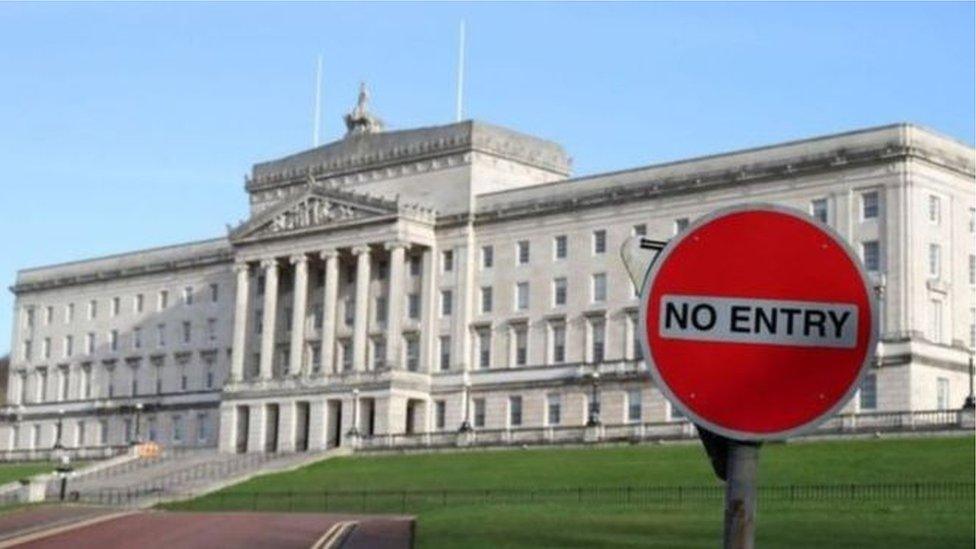
The Stormont institutions collapsed in January 2017
The Northern Ireland power-sharing executive at Stormont - which was established by the agreement - collapsed in January 2017.
- Published16 October 2019

- Published17 September 2018
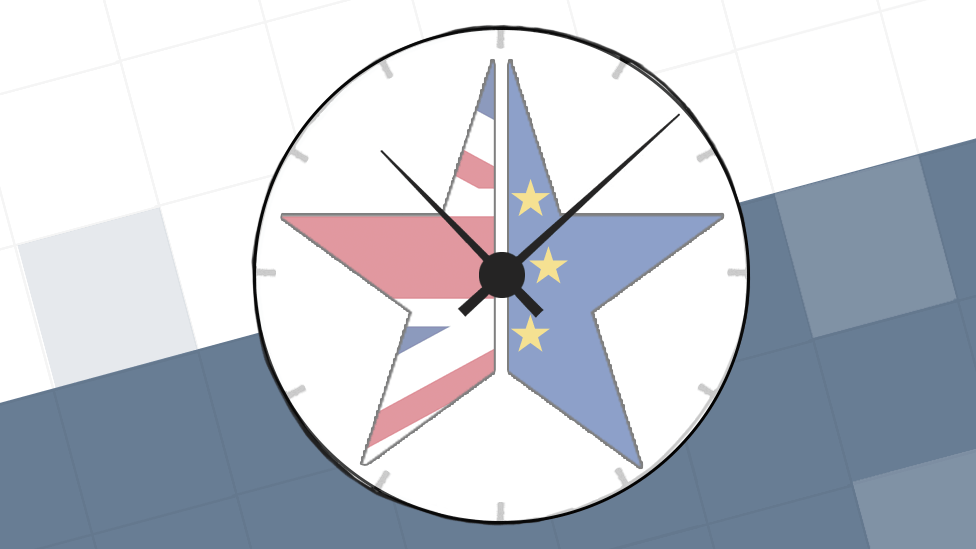
- Published1 October 2018
